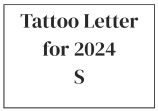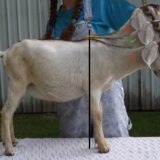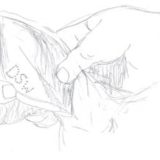Testing requires 20-30 Hairs With Roots
Hair root from coarse, longer hair often found over:
- withers
- chest
- rump
- tail
- back of hind leg
- poll
- or fetlock
is the preferred sample type for goats.
Storing Hair Samples
To store the sample, you pull the hair, place in a paper envelope (separate envelope for each goat), and keep at room temperature away from any chance of bugs getting to it.
Samples are good this way for up to 10 years.
Never use plastic to store samples, and do not refrigerate or freeze.
Parentage Testing Procedures - DNA - $35
A DNA profile—which provides allele sizes for all microsatellite markers—is obtained, and parentage analysis is performed. A variety of sample types can be utilized for routine testing, including blood, hair, semen, buccal swabs and FTA cards. Non-routine sample types include bone, teeth, saliva, dried blood, urine and feces. DNA is extracted from the samples, and microsatellite marker analysis begins with the PCR procedure. In this process a computer program compares the DNA profile of the offspring to those of the presumed parents. A parentage analyst reviews the results and sends the final report. If a listed parent or parents are excluded, additional analysis is performed including retesting of samples and the possible use of additional DNA markers to confirm the exclusion.
*If there is any question about a kid(s) sire, i.e. more than one buck in a doe pen, All kids will be required to have a DNA test completed as well as at least one of the bucks (if there are only 2 bucks in question) will need to be tested in order to register the kid(s).
Alpha S1 Casein Testing - $25
Alpha s1 Casein is one of the four casein proteins found in goat's milk and is the most important of the four for cheese making. The Alpha s1 Casein gene (CSN1S1) that produces the protein shows polymorphisms which affect the amount of protein and fat produced, with higher levels associated with the best cheese making. Research suggests that low levels of Alpha s1 Casein, may be associated with reduced milk sensitivities for some people.
G6-Sulfatase Deficiency(G6S, MPSIIID) - $25
G6-Sulfatase deficiency is an inherited metabolic defect that occurs in Nubian goats and related crosses. A mutation in the G6-S gene renders the enzyme incapable of degrading complex polysaccharides known as heparin-sulfate glycosaminoglycans (HS-GAGs) which then abnormally accumulate in tissues such as central nervous system and viscera. Clinically, affected goats exhibit delayed motor development, growth retardation, and early death. The disease is inherited in an autosomal recessive fashion. Therefore, both sexes are equally affected and two copies of the defective gene must be present for signs of the disorder to be observed. Breeding two carrier goats, which are normal but each possesses a single copy of the mutation, is predicted to produce 25% affected offspring.
Goat Scrapie Susceptibility - S146 & K222 $25
The VGL offers a DNA test for classical scrapie in goats to screen for presence/absence of the resistance alleles S146 and K222. Information from the test can be used by breeders to select breeding stock to increase frequency of beneficial alleles in their herds. Breeding for resistance is an effective means to control classical scrapie in goats at the herd and population levels. This test is applicable to goats of all types and breeds, including those raised in the U.S.
You can test ANY goat you own, Standards, Nigerians, Minis, MDGA registered or not MDGA registered.








